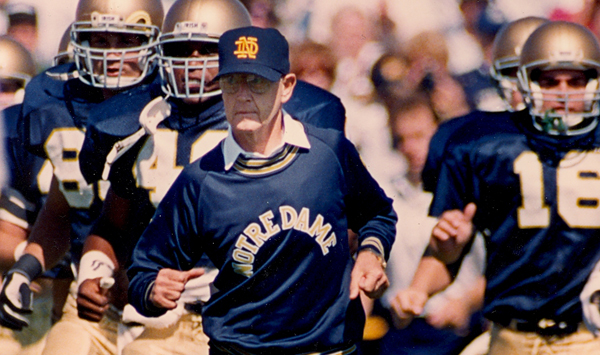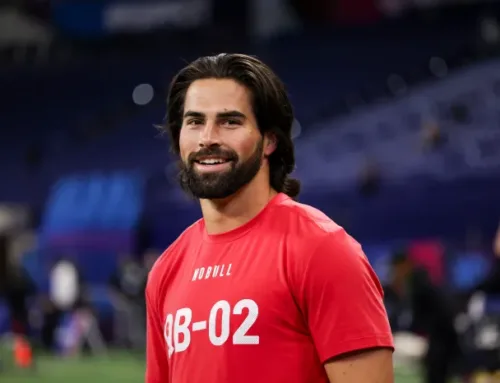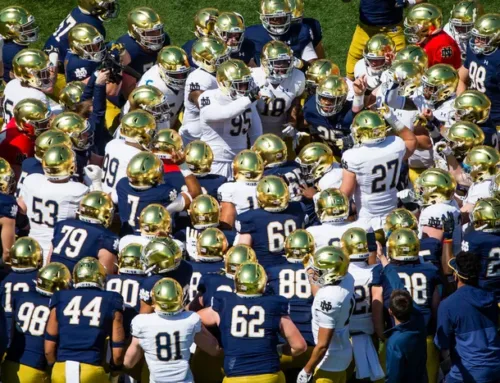Lou Holtz occupies a strange place in Notre Dame lore. I was recently thinking about him after debating Muffet McGraw’s place in the pantheon of Fighting Irish coaches while Holtz wasn’t even mentioned mostly due to the fact that he didn’t meet the qualifying 2 championship criteria. We’re now reaching the age where Holtz’ tenure at Notre Dame–coming up on 22 seasons without him on campus–is really starting to look dim in the rear-view mirror.
Holtz is certainly a legend but an odd one at that–I’m a bit curious about his stock as it stands in 2018. Here are a handful of things that either aren’t aging very well or haven’t helped Notre Dame in the years that have past.
Hard Schedules as the Norm
The strength of Notre Dame’s scheduled has been a debate as old as time. Nearly every day all year long you can find an argument somewhere on the web about the Irish schedules. While things may have devolved into a bit of a morass lately (I swear if I have to read another comment about Notre Dame not scheduling “to win”) there is no denying that some of Holtz’ schedules were insane.
I think for some those schedules were the norm (they weren’t) or rather they should be the norm (they shouldn’t). The landscape is a little different now with the playoffs and conference title games but holding the school hostage to some ridiculous schedules achieves nothing. Unless, college football starts handing out a National Championship for the toughest schedule?
Look at it this way, Holtz played 53 teams in the Top 20 in his 11 seasons at Notre Dame. The football program has played 69 teams in the Top 20 since he left. That’s craziness.
Aging Offense
I’ve long made the complaint that a huge failed opportunity for Notre Dame was missing out on the offensive boom that came crashing into college football during the 1990’s. Kelly arrived a good decade after the first of the booming spread offenses and the Irish have been playing catch up with zero continuity (think Oklahoma from Stoops to Riley) ever since.
Lou Holtz ran an anti-modern offense during his tenure, then dabbled more in a soon-to-be aging I-formation offense, and ended his time with the Irish in a fog of mish-mash systems led by Ron Powlus at quarterback. He left behind zero legacy of a stable offensive system which makes it all the more strange when people claim Notre Dame needs to return to this era of offensive football to win again.
Uncool is Cool
Holtz’ legacy of making the uncool cool has reverberated for decades. In response to not wearing bowl game patches for the Fiesta Bowl against West Virginia he quipped he’d have players without numbers on their jerseys if he had his way. How gritty!
I’ve covered this ethos extensively in the past and it absolutely infected all things Notre Dame during the 1990’s where innovation died at the hands of stale tradition, teeth-clenching toughness, and an obsession with everything plain.
Love Thee Notre Dame
Lou Holtz really, really, really, really, really loves Notre Dame. Even if some of it has always been an act he symbolizes the hokey, over-the-top, sappy Notre Dame fan who wakes up singing the Victory March and inserts the Fighting Irish into any conversation possible.
There’s also a weird juxtaposition with Holtz being the no-nonsense task master behind close doors (see above) but who also has this soft underbelly infomercial personality about the greatness of Notre Dame and can’t shut up about it since leaving coaching.
Weird Ambassador
Holtz’ decade-long run on ESPN and love/hate act with Mark May pretty much gave him an entire new persona in the world for thousands of college football fans who knew almost nothing about his coaching days at Notre Dame.
From this new media personality, to repeating the same Notre Dame stories and quips over and over and over and over again, to his spotlight during the 2016 Presidential election Holtz has been kind of a mascot that can make people cringe. Some people like it but you have to admit Holtz stands alone in this regard and is a complete 180 to the way someone like Ara Parseghian conducted himself post-retirement.





Hot 🔥🔥🔥 Friday.
Jake Evans is good for Notre Dame.
I think we’ve played a nice number of top-20 teams since Lou left.
I think the “weird ambassador” thing has actually been good for ND. It’s always been my contention that the more “haters” your team has, the better it is for your team. And people absolutely hated Lou when he’d start his yelling matches with Mark May, and in turn hated ND. But haters will hate-watch your program, and it’s always good to have eyeballs on your team (except when you’re going 3-9 or 4-8).
That being said, as somebody born in 1989, I don’t really remember watching any good Holtz teams. So to me, he’s nothing more than the goofy bobblehead I’ve seen on ESPN. I don’t get to have fond memories of the 88 squad, and I don’t remember the excitement of the 1993 season. To me, all I’ve ever known him as is some guy on TV who has annoying segments with Mark May, and a guy who makes for a beloved cheerleader at pep rallies.
I completely understand why many (perhaps most) ND fans love him. But to me, I basically know him as another in the long line of celebrity ND fans.
I love him! He turned a moribund program around and gave us a taste winning again. He built a recruiting program that pulled great football players in.
I think Kelly has done something similar. I know that sentiment ain’t popular.
I agree that he’s goofy, he always has been. I also agree that he loved everything simple and difficult. I think, for him, overcoming adversity is one of the greatest achievements people can accomplish.
He is goofy.
Drag the heretic!
Im a big fan of the disembowelment and burning of the entrails
As someone who is from the Era of Ara, I really loved Lou Holtz and figure that we should have won three National Championships under him, as opposed to only one.
The first team that should have won was the 1989 team. It truly played an insane schedule, which included 4 Top Ten opponents, and two more Top Twenty Opponents (and it went on to defeat No. 1 ranked Colorado in the Orange Bowl, 21-6). We were denied the National Championship because our only loss was to Miami, which won the NC that year (Miami had one loss as well, it just wasn’t to us).
The second team that should have won was the 1993 team. It only played three top 20 teams, but defeated No. 1 (Florida State) and No. 2 (Michigan). We were denied the National Championship because of our only loss to No. 16, Boston College (by 2 points, after we came back from a huge deficit). Florida State was given the National Championship over us, whose one loss was to us. Lou argued that, if we were denied the NC in ’89 because our one loss was to the team that won it that year, under that same logic, we should be given the NC over a one loss team that we beat. People hated Lou Holtz and liked Bobby Bowden, and were concerned that if he wasn’t given a NC that year, he might never get one (leading me to call the NC that year “The Bobby Bowden Lifetime Achievement Award”).
So, I don’t think Lou was bad for Notre Dame Football. I have issues with his sometimes embarrassing homerism for ND in subsequent years (his politics shouldn’t be discussed on this blog, I think, as it is a divisive issue), but he revived a program that was languishing, and turned us into a powerhouse that was feared by the rest of college football.
Oh, Lou was very good for Notre Dame. But not just in all areas 😉
Ditto on the 3 NCs (or more). i think that if Lou had been hired in ’81 instead of Faust he would’ve had a very Sabanesque tenure at ND. The downturn in the mid-90s would still have happened and the lack of offensive continuity Eric mentioned would still be a thing, but the perception of the program would have been different since they would’ve been dominant from ’64 through ’93. Davieweisingham wouldn’t have happened and JJ Abrams wouldn’t have made those stupid Kelvin timeline Star Trek movies.
Counterpoint to all of this, some of which had merit: If not for Lou, ND would essentially be a dead program. Lou is the only winning coach we’ve had in the era where most people had color TVs.
It’s too dark to think about. What if no Rocket? I can’t even.
So, Eric, are you just looking for ways to troll the folks over at NDN????
Are you doubting my sincerity, sir??
Interesting points. I’m sympathetic to the terrible offense charges – my mom still laughs at how my dad would complain about Lou’s calls. That said, the complete lack of innovation in any part of the football program post Lou suggests that Malloy and Kevin White deserve a good deal of blame – though Lou was surely not an innovator.
Speaking of innovating the updated new practice facility was formally announced today.
Any renderings? When one considers that Loftus has been around since 1988, it both has held its own for a lengthy period of time and definitely needs an addition/replacement. Getting a full-size football and soccer field indoors while having a roof high enough for special teams should help those programs considerably.
I haven’t seen anything concrete. About 10 months ago there was some info out there on what they were doing but I can’t seem to track it down. Here’s what I remember:
An extension is being built to the south of the current Gug. There’s going to be a lot of stuff in there (study space, new training table, lounges, etc.) but also new practice locker room and weight room for football. The press release says the new facility is 111,400 square feet but I’m not sure if that includes the new practice field or not? There doesn’t seem to be THAT much room to build next to the Gug….plus….the Gug and Loftus are a combined 34,000 square feet. So, I don’t know what’s going on unless this new building is like 5 floors or something.
There was mention of a raised walk-way for players to cross Courtney Lane quickly from the new building to the new practice field.
The new indoor practice field is being built on the ground of the current western-most turf football field. They’ve already started construction. There’s supposed to be a mini video board and enough space to practice special teams. As far as I remember, the other two outdoor fields were being kept but I could be wrong.
The new indoor field will also be used by both soccer teams. With football “moving out” of the Gug proper that square footage will be remodeled (I think) for other Olympic sports and (I’m pretty sure) Loftus was going to be upgraded so as not to look like a Russian gulag.
Lou was great at playing to the strengths of his players. The difference in his offenses from
’88 to ’94 were telling, but he was trying to set his best players up for success by using their strengths. Like Navy, when no one can stop it, that philosophy can be great. When you don’t have the right pieces, it can be very frustrating (like ’94 & ’95).
Provocative article on a Friday. Here’s my take as someone who grew up rooting for Ara and Devine’s teams, and was a student at the end of Devine’s era and beginning of Faust:
– Holtz was a great college coach (as a Jets fan, I can confirm he wasn’t made for the NFL)
– He didn’t resurrect a moribund program. He just replaced a disaster of a coach, and then did an amazing job.
– I agree with the “weird ambassador” comment. He always had a phony persona, the ESPN gig just was way over the top. It’s interesting that a lot of people who think Kelly’s an asshole act like Holtz was a nice guy. He never was. Kelly is just more transparent.
– For me, Holtz is nowhere near Ara in any way, shape or form. Although Devine wasn’t popular at the end of his run (difficult to follow a legend), I’m much happier with Devine as an ND representative than Holtz.
Interesting take. I tend to side with you, the quieter and dare I say more noble former coaches are more up my alley.
Lou was my first coach, so I am completely biased and will never utter an ill will against him. I think you’re focusing on what Lou WASNT as a way to find fault with what he was. I dont know that Lou was ever supposed to be an Xs and Os coach. He was a master of motivation and playing matchups. He inspired players and sold the University to recruits. I havent seen anyone come close to what he did. Plus, the man won 2 national championships so he gets a lifetime pass from me.
Spot on, Clearwall. Lou was a motivational genius, and whoever said that but for him we’d have been a dead program for a loooooong time is correct.